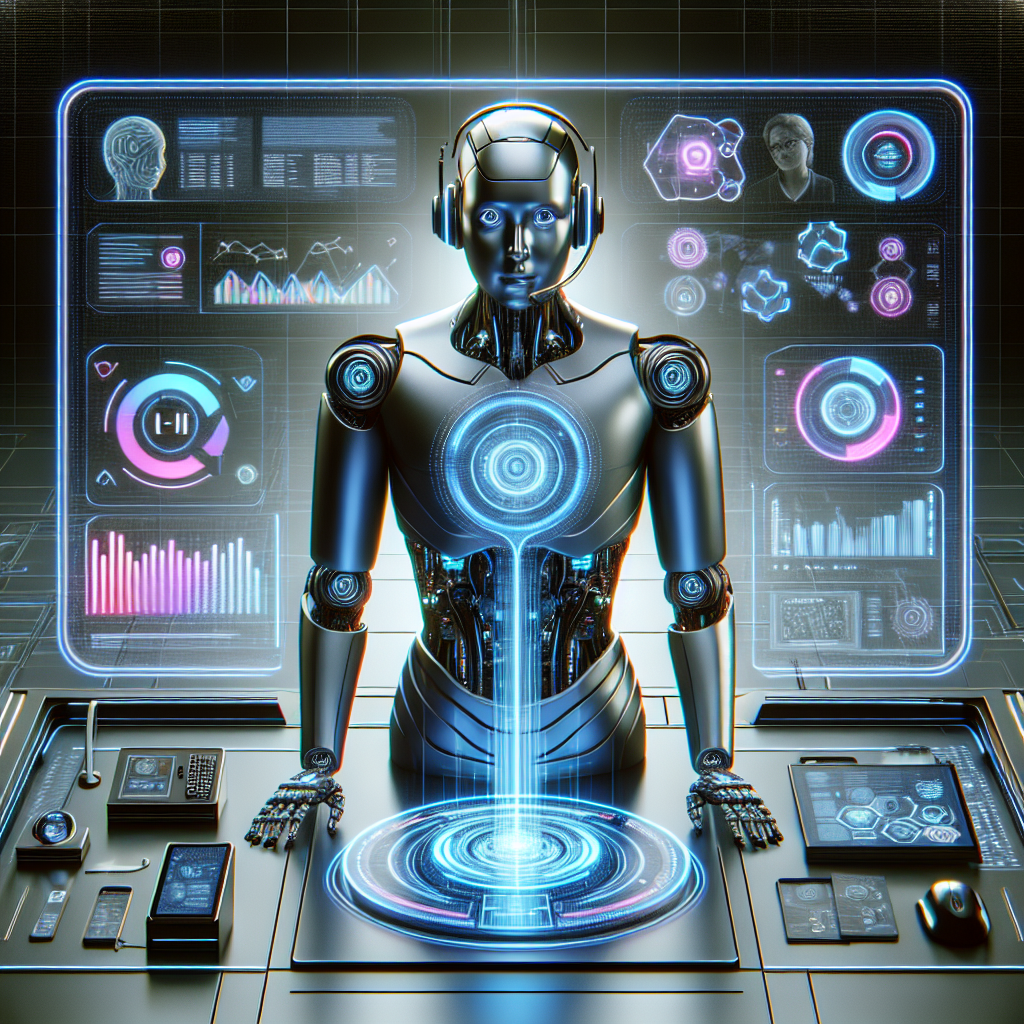AI for IT Customer Service
“Enhancing IT Customer Service with AI: Efficiency, Accuracy, and Seamless Support.”
Introduction
AI, or Artificial Intelligence, has revolutionized various industries, including IT customer service. With its ability to simulate human intelligence and perform tasks that typically require human intervention, AI has become an invaluable tool for enhancing customer support in the IT sector. By leveraging advanced technologies such as natural language processing, machine learning, and data analytics, AI enables businesses to provide efficient, personalized, and round-the-clock customer service, ultimately improving customer satisfaction and streamlining IT operations. In this introduction, we will explore the role of AI in IT customer service and its benefits for both businesses and customers.
The Role of AI in Enhancing IT Customer Service
Artificial Intelligence (AI) has revolutionized various industries, and IT customer service is no exception. With its ability to analyze vast amounts of data and learn from it, AI has become an invaluable tool for enhancing customer service in the IT sector. In this article, we will explore the role of AI in IT customer service and how it can improve the overall customer experience.
One of the key benefits of AI in IT customer service is its ability to provide instant and accurate responses to customer queries. Traditional customer service methods often involve long wait times and the need for human intervention. However, AI-powered chatbots can handle multiple customer queries simultaneously, providing quick and efficient solutions. These chatbots are programmed to understand natural language and can provide personalized responses based on the customer’s specific needs.
Moreover, AI can also assist in problem-solving by analyzing historical data and identifying patterns. By doing so, it can predict potential issues and provide proactive solutions. This not only saves time but also prevents future problems from occurring. For example, AI can detect a potential network outage and notify the IT team before it affects the customers. This proactive approach ensures that customer service is not only reactive but also preventive.
Another significant advantage of AI in IT customer service is its ability to automate repetitive tasks. IT support teams often spend a significant amount of time on mundane tasks such as password resets or software installations. By automating these tasks, AI frees up the IT team’s time, allowing them to focus on more complex and critical issues. This not only improves efficiency but also reduces the response time for customer queries.
Furthermore, AI can enhance the customer experience by personalizing interactions. By analyzing customer data, AI can understand individual preferences and tailor its responses accordingly. For example, if a customer frequently contacts the IT support team regarding a specific software issue, AI can proactively provide updates or solutions related to that particular problem. This personalized approach makes customers feel valued and enhances their overall satisfaction.
Additionally, AI can also assist in knowledge management. IT support teams often struggle with managing vast amounts of information, such as troubleshooting guides or software documentation. AI-powered systems can organize and categorize this information, making it easily accessible to both the support team and customers. This ensures that accurate and up-to-date information is readily available, reducing the need for repetitive queries and improving the overall efficiency of the support process.
In conclusion, AI plays a crucial role in enhancing IT customer service. Its ability to provide instant and accurate responses, automate repetitive tasks, and personalize interactions significantly improves the overall customer experience. By leveraging AI, IT support teams can streamline their processes, reduce response times, and proactively address potential issues. As AI continues to evolve, its impact on IT customer service is only expected to grow, making it an indispensable tool for the industry.
Implementing AI Chatbots for Efficient IT Customer Support

Artificial Intelligence (AI) has revolutionized various industries, and the field of IT customer service is no exception. Implementing AI chatbots for efficient IT customer support has become increasingly popular, as businesses strive to enhance their customer service experience. In this article, we will explore the benefits of using AI chatbots in IT customer service and discuss how to effectively implement them.
One of the primary advantages of using AI chatbots in IT customer service is their ability to provide instant and round-the-clock support. Unlike human agents, chatbots are available 24/7, ensuring that customers receive assistance whenever they need it. This not only improves customer satisfaction but also reduces the workload on human agents, allowing them to focus on more complex issues.
Furthermore, AI chatbots are highly efficient in handling repetitive and mundane tasks. They can quickly address common IT issues, such as password resets or software updates, without the need for human intervention. This not only saves time but also increases productivity, as human agents can dedicate their efforts to more critical and strategic tasks.
Another significant benefit of AI chatbots is their ability to provide personalized support. Through machine learning algorithms, chatbots can analyze customer data and preferences to offer tailored solutions. This personalized approach enhances the customer experience, making them feel valued and understood. Moreover, chatbots can remember previous interactions, allowing for seamless continuity in customer support.
Implementing AI chatbots for IT customer service requires careful planning and execution. The first step is to identify the specific areas where chatbots can be most effective. Analyzing customer data and feedback can help identify common issues that can be automated through chatbots. Additionally, it is crucial to define the scope and limitations of the chatbot’s capabilities to manage customer expectations.
Once the areas of implementation are identified, the next step is to develop and train the chatbot. This involves creating a knowledge base that encompasses a wide range of IT issues and their corresponding solutions. Machine learning algorithms can then be used to train the chatbot, enabling it to understand and respond to customer queries accurately. Regular updates and improvements are necessary to ensure the chatbot remains up-to-date with the latest IT trends and developments.
To ensure a seamless integration of AI chatbots into IT customer service, it is essential to provide proper training to human agents. They should be familiarized with the chatbot’s capabilities and limitations, enabling them to effectively collaborate with the AI system. This collaboration can enhance the overall customer service experience, as human agents can step in when the chatbot encounters complex issues or when a more personalized approach is required.
In conclusion, implementing AI chatbots for efficient IT customer support offers numerous benefits. They provide instant and round-the-clock support, handle repetitive tasks, and offer personalized solutions. However, successful implementation requires careful planning, development, and training. By leveraging the power of AI chatbots, businesses can enhance their IT customer service and improve overall customer satisfaction.
Leveraging AI Analytics for Improved IT Customer Service Experience
AI for IT Customer Service
In today’s fast-paced digital world, customer service plays a crucial role in the success of any business. This is especially true in the IT industry, where customers rely heavily on technical support to resolve their issues and keep their systems running smoothly. With the advancements in artificial intelligence (AI) technology, businesses are now able to leverage AI analytics to improve the IT customer service experience.
AI analytics refers to the use of AI algorithms and machine learning techniques to analyze large amounts of data and extract valuable insights. By applying AI analytics to IT customer service, businesses can gain a deeper understanding of their customers’ needs and preferences, and provide more personalized and efficient support.
One of the key benefits of using AI analytics in IT customer service is the ability to automate repetitive tasks. AI-powered chatbots, for example, can handle basic customer inquiries and provide instant responses, freeing up human agents to focus on more complex issues. This not only improves response times but also reduces the workload on support teams, leading to increased productivity and cost savings.
Furthermore, AI analytics can help businesses identify patterns and trends in customer issues, allowing them to proactively address common problems before they escalate. By analyzing historical data, AI algorithms can detect recurring issues and provide recommendations for preventive measures. This not only improves customer satisfaction but also reduces the number of support tickets and the associated costs.
Another way AI analytics can enhance the IT customer service experience is through sentiment analysis. By analyzing customer interactions, AI algorithms can determine the sentiment behind customer messages, whether it is positive, negative, or neutral. This allows businesses to prioritize and address customer concerns based on their urgency and severity. For example, if a customer expresses frustration or dissatisfaction, the system can automatically escalate the issue to a senior support agent for immediate attention.
Moreover, AI analytics can enable businesses to offer personalized recommendations and solutions to customers. By analyzing customer data, such as past purchases, preferences, and browsing behavior, AI algorithms can suggest relevant products or services that meet the customer’s specific needs. This not only enhances the customer experience but also increases cross-selling and upselling opportunities.
However, it is important to note that while AI analytics can greatly improve the IT customer service experience, it should not replace human interaction entirely. Customers still value the human touch and the ability to speak to a knowledgeable support agent when facing complex issues. Therefore, businesses should strike a balance between AI-powered automation and human assistance to provide the best possible customer service.
In conclusion, leveraging AI analytics for improved IT customer service experience is a game-changer for businesses in the IT industry. By automating repetitive tasks, proactively addressing issues, analyzing customer sentiment, and offering personalized recommendations, businesses can provide more efficient and tailored support to their customers. However, it is crucial to remember that AI should complement human interaction, not replace it. By finding the right balance, businesses can deliver exceptional customer service and gain a competitive edge in the market.
Conclusion
In conclusion, AI has proven to be a valuable tool for IT customer service. It has the potential to enhance efficiency, accuracy, and customer satisfaction by providing quick and accurate responses to queries, automating repetitive tasks, and offering personalized recommendations. However, it is important to strike a balance between AI and human interaction to ensure a seamless customer experience. While AI can handle routine tasks, human agents are still essential for complex issues that require empathy, critical thinking, and problem-solving skills. By leveraging the strengths of both AI and human agents, organizations can deliver exceptional IT customer service.

